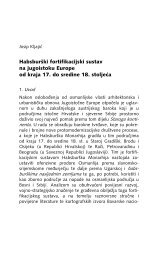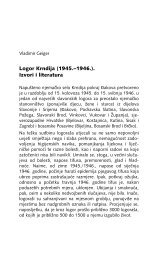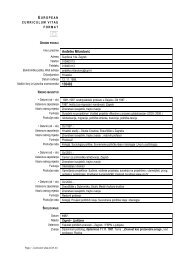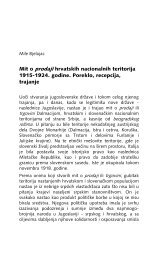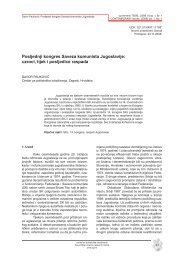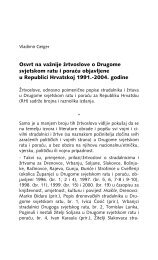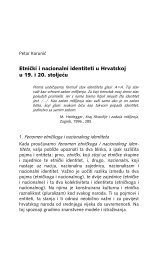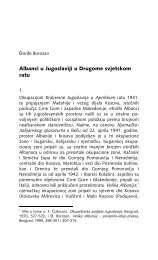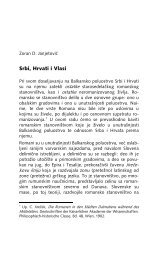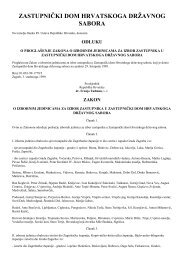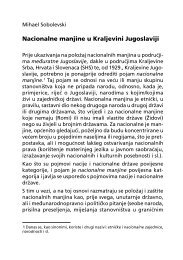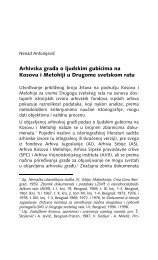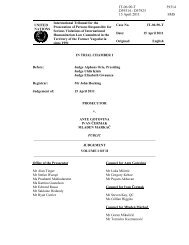ISSN 1847-2397 godište II broj 1 2009. | volume II number 1 2009
ISSN 1847-2397 godište II broj 1 2009. | volume II number 1 2009
ISSN 1847-2397 godište II broj 1 2009. | volume II number 1 2009
- No tags were found...
You also want an ePaper? Increase the reach of your titles
YUMPU automatically turns print PDFs into web optimized ePapers that Google loves.
Plamena Pehlivanova: The Decline of Trust in Post-Communist Societiessuvremene TEME, (<strong><strong>2009</strong>.</strong>) God. 2, Br. 1CONTEMPORARY issues, (<strong>2009</strong>) Vol. 2, No. 1cohort strongly supporting the President, while1993 reported less than 50% support. The turningpoint was the reign of Z. Zhelev’s appealfor a national agreement and the restructuringof the political space. The results proved a dropin shared trust toward his personality and at theend of 1995 Bulgarian voters reported less than50% support. It is interesting to note that Georgievalso argues that the attitudes toward thePresidency are not influenced by the hypotheticmodels of “imperial”, “corporative” or “symbolicallyweek”. Instead of evaluating on the “idealtype model”, the Bulgarians prove to be influencedmore by the personality of the individual.Personal legitimacy has clearly become moreimportant than the institutional legitimacy modelof the Soviet past. Here charisma dominates“the regime”. “President of ‘all Bulgarians’ hasbeen the most acceptable mantra of latest votingcampaigns, whereby a ‘non-militant’ (eventhough paternalist) role of the President is givenmerit.” (Georgiev, 2007: 112). The Alpha Research4 done in October 2000 further discussesthe trust toward the President:“In general, the Bulgarians are morelikely to trust institutions as the Presidentand the mayor, which are directlyelected and are embodied by a certainpersonality. This to large extent is due tothe strict reticence towards the peoplearound - 77% of the respondents standto the position that “one has to be verycautious with the people” (Alpha Research,2000: 4).Unfortunately, the World Value Surveydoesn’t study the confidence level for the roleof the president in the Bulgarian society. Nevertheless,WVS shows “Confidence in the ArmedForces” as being 60%. The Bulgarian army enjoyshigher trust than any other institution since1989. This is because the army has been traditionallyand rather sentimentally bound institutionin the nation’s political culture. Georgiev furtherdefines the army as a contributor toward the territorialintegrity and has played a role of significantsocializing institution (Georgiev, 2007:112). Justas Tocqueville defines the intermediary organisationsas socialization structures, the Bulgarianarmy is seen as a “melting pot” for ethnic, educationaland cultural differences in the country.4 Alpha Research is a private, independent full-service researchagency, established in 1997. It is a member of ESO-MAR (The European Society for Opinion and Market Research)and of the Bulgarian Sociological Association.Therefore, the army counts as a reliable factor ofstability in Southeastern Europe. Since societalexpectations remained unmet after the fall of theregime, the social distress and antagonism grewconstantly. Negativism toward the previous politicalsystem is mostly observed in the youngergeneration (15-29 year olds). The elderly, however,show more trust and more optimism towardthe old political regime and towards the armedforces. Instead, the people over 50 years of agereport the most dissatisfaction with life; they tendto have the lowest income levels and to be mistreatedby the state as they receive miserablepensions.A 45% of the people over 50 years ofage (the sociodemographics given by the WVS)witness total butchering of their expectations bythe mistreatment of the state. Thus, the growthof antagonism and nostalgia within the circles ofthe older population seem inevitable. The needfor a strong leader is expressed by the Bulgariansociety in the WVS, which reports 48% beingin favor of having a strong leader. Contrastingly,only 13% of the interviewed Chinese reported asbeing in favor of such model. Even after the fallof communism and the fight for democracy, theBulgarian mentality remains most trustful in thepaternalistic-authoritarian model.Not very different from the Chinesecase, the Eurobarometer for 2008 reports Bulgariaas definitely in favor of more economic developmentand interested in materialist values,rather than post-materialist issues. For example,“What expenditure, do you think, has the largestshare of the European Union budget?” (2008),38% of Bulgarians report as “don’t knows”. 35%think that they go for economic growth and only1% think that they go for culture and media.However, when asked “For what sector wouldyou like most of the EU budget to be used?” Bulgariansplace first the economic growth (like theChinese) and least the culture/media (Table 6).This opinion study of the European Barometer(2008) shows that the society is in needof economic betterment; it focuses mostly on thematerialist values, rather than post-materialist issues.6. The FamilyThe analysis up to here aimed to explainthe reasons and effects of decline in trust in theBulgarian and Russian society. We looked athow income and economic levels affect participation,how materialist state goals hamper therise of post-materialist values and movements.centar za politološka istraživanjathe political science research centrewww.cpi.hr39



